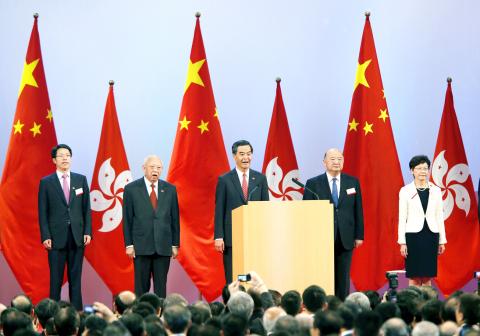Hong Kong Liaison Office Director Zhang Xiaoming (張曉明) has warned democracy campaigners in the former British colony against pushing for independence and confronting Beijing, Xinhua news agency reported.
Pro-democracy protesters in Hong Kong shut down major business districts for two-and-a-half months last year, with the “Umbrella movement” demanding open nominations in the next election of the territory’s chief executive in 2017.
Beijing has said it will allow a vote, but only for pre-screened candidates.

Photo: Reuters
In his most extensive comments since police cleared the protesters from the territory’s highways in mid-December, China’s top official in Hong Kong made it clear that Beijing is moving toward tighter control of the global financial hub.
“We could not allow any attempt to reject the central authority’s jurisdiction over Hong Kong under the pretext of a high degree of autonomy, to advocate ‘Hong Kong independence,’ or even to overtly confront with the central government through illegal ways,” Zhang said on Wednesday at a reception attended by top officials, according to Xinhua.
There is no mainstream independence movement in Hong Kong, although some activists want a continued campaign of civil disobedience this year to force Beijing to accept fully democratic elections.
Banners seeking to humiliate Hong Kong and Chinese leaders, including Chinese President Xi Jinping (習近平), festooned streets and government buildings during last year’s protests.
Democratic Legislative Council Legislator Emily Lau (劉惠卿) said Zhang’s comments were “improper and inappropriate” for a mainland official and blurred the boundaries between Hong Kong and China’s governance systems.
“It seems they want to interfere, they want to take the lead and it is very alarming,” Lau said.
Zhang on Wednesday said it was necessary to rethink the relationship between the two and that Hong Kong’s pro-democracy protests had proved its rule of law could be “fragile.”
Zhang also suggested Beijing could take a renewed interest in patriotic education, a touchy subject that sparked protests in Hong Kong in 2012.
“Priority should be given to the history, culture and national conditions of China in the education of the young people so that they could fully understand that the destiny and future of Hong Kong are closely connected to those of the motherland,” Zhang said, according to Xinhua.
About 4,000 people attended the reception where Zhang spoke, including Hong Kong Chief Executive Leung Chun-ying (梁振英), former Hong Kong chief executive Tung Chee-hwa (董建華), officials from state firms and foreign diplomats.

‘ABUSE OF POWER’: Lee Chun-yi allegedly used a Control Yuan vehicle to transport his dog to a pet grooming salon and take his wife to restaurants, media reports said Control Yuan Secretary-General Lee Chun-yi (李俊俋) resigned on Sunday night, admitting that he had misused a government vehicle, as reported by the media. Control Yuan Vice President Lee Hung-chun (李鴻鈞) yesterday apologized to the public over the issue. The watchdog body would follow up on similar accusations made by the Chinese Nationalist Party (KMT) and would investigate the alleged misuse of government vehicles by three other Control Yuan members: Su Li-chiung (蘇麗瓊), Lin Yu-jung (林郁容) and Wang Jung-chang (王榮璋), Lee Hung-chun said. Lee Chun-yi in a statement apologized for using a Control Yuan vehicle to transport his dog to a

BEIJING’S ‘PAWN’: ‘We, as Chinese, should never forget our roots, history, culture,’ Want Want Holdings general manager Tsai Wang-ting said at a summit in China The Mainland Affairs Council (MAC) yesterday condemned Want Want China Times Media Group (旺旺中時媒體集團) for making comments at the Cross-Strait Chinese Culture Summit that it said have damaged Taiwan’s sovereignty, adding that it would investigate if the group had colluded with China in the matter and contravened cross-strait regulations. The council issued a statement after Want Want Holdings (旺旺集團有限公司) general manager Tsai Wang-ting (蔡旺庭), the third son of the group’s founder, Tsai Eng-meng (蔡衍明), said at the summit last week that the group originated in “Chinese Taiwan,” and has developed and prospered in “the motherland.” “We, as Chinese, should never

‘A SURVIVAL QUESTION’: US officials have been urging the opposition KMT and TPP not to block defense spending, especially the special defense budget, an official said The US plans to ramp up weapons sales to Taiwan to a level exceeding US President Donald Trump’s first term as part of an effort to deter China as it intensifies military pressure on the nation, two US officials said on condition of anonymity. If US arms sales do accelerate, it could ease worries about the extent of Trump’s commitment to Taiwan. It would also add new friction to the tense US-China relationship. The officials said they expect US approvals for weapons sales to Taiwan over the next four years to surpass those in Trump’s first term, with one of them saying

INDO-PACIFIC REGION: Royal Navy ships exercise the right of freedom of navigation, including in the Taiwan Strait and South China Sea, the UK’s Tony Radakin told a summit Freedom of navigation in the Indo-Pacific region is as important as it is in the English Channel, British Chief of the Defence Staff Admiral Tony Radakin said at a summit in Singapore on Saturday. The remark came as the British Royal Navy’s flagship aircraft carrier, the HMS Prince of Wales, is on an eight-month deployment to the Indo-Pacific region as head of an international carrier strike group. “Upholding the UN Convention on the Law of the Sea, and with it, the principles of the freedom of navigation, in this part of the world matters to us just as it matters in the